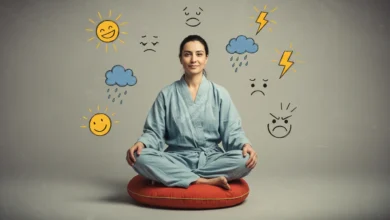How Does Meditation Impact Our Perception of Time?

Meditation is often associated with a range of benefits, from stress reduction to enhanced focus. However, one intriguing aspect that is less commonly discussed is how meditation impacts our perception of time. Our perception of time can be fluid and subjective, influenced by various factors such as emotions, attention, and external stimuli. Through the practice of meditation, individuals may experience a shift in how they perceive the passage of time, leading to a more profound awareness of the present moment and a different relationship with time itself.
1. Understanding Time Perception
Time perception refers to the subjective experience of the passage of time. It is not an objective measure but rather a mental construct that can be influenced by internal and external factors. Research has shown that individuals may perceive time differently depending on their state of mind, level of attention, and emotional state. Meditation, with its focus on mindfulness and awareness, offers a unique opportunity to explore and potentially alter our perception of time.
2. The Impact of Meditation on Time Perception
Meditation practices often involve techniques that encourage individuals to be fully present in the moment, cultivating a heightened sense of awareness. By training the mind to be more attentive and focused, meditation can alter how we experience the passage of time. Studies have suggested that regular meditation may lead to a more accurate perception of time, with meditators reporting a greater sense of time dilation or expansion during their practice.
3. Research Findings on Meditation and Time Perception
Research in the field of neuroscience has started to uncover the mechanisms behind how meditation influences time perception. A study conducted at the University of Exeter found that mindfulness meditation can alter the perception of time, with participants estimating shorter durations for stimuli presented during a meditative state. Another study published in the journal Psychological Science showed that experienced meditators were better at estimating the duration of intervals compared to non-meditators. These findings suggest a link between meditation practice and changes in time perception.
4. Factors Influencing Time Perception in Meditation
Several factors can influence how meditation impacts our perception of time. The type of meditation practice, the individual’s level of experience, and their ability to maintain focus and attention all play a role in shaping time perception. Different meditation techniques, such as focused attention or open monitoring, may have varying effects on how time is subjectively experienced by practitioners.
5. The Role of Mindfulness in Time Perception
Mindfulness, a key component of many meditation practices, involves being fully present and aware of one’s thoughts, feelings, and sensations. By cultivating mindfulness through meditation, individuals can develop a more accurate and nuanced perception of time. Mindful awareness allows individuals to observe the passing of time without judgment or attachment, leading to a deeper understanding of the temporal nature of experience.
6. Table: Comparison of Time Perception in Meditators vs. Non-Meditators
| Aspect | Meditators | Non-Meditators |
|---|---|---|
| Time Estimation | More accurate and consistent estimates | Varied estimates with less consistency |
| Sense of Time Dilation | Increased perception of time dilation | Limited perception of time dilation |
| Temporal Awareness | Heightened awareness of temporal flow | Less focus on temporal aspects |
7. Benefits of Improved Time Perception
Enhancing our perception of time through meditation can have various benefits in daily life. Individuals with a more accurate sense of time may experience reduced feelings of hurry and time pressure, leading to decreased stress and anxiety. Improved time perception can also enhance decision-making abilities and increase overall productivity and efficiency.
8. Practical Tips for Exploring Time Perception Through Meditation
If you’re interested in exploring how meditation can impact your perception of time, consider incorporating the following tips into your practice:
– Start with short, regular meditation sessions to build consistency.
– Focus on mindfulness and present-moment awareness during your practice.
– Pay attention to how your perception of time shifts before, during, and after meditation.
9. Conclusion
In conclusion, meditation can significantly influence our perception of time by fostering mindfulness, enhancing temporal awareness, and altering how we experience the passage of time. By incorporating meditation into our daily routines, we can cultivate a more profound sense of time and a greater appreciation for the present moment. Exploring the relationship between meditation and time perception offers a unique opportunity for personal growth and self-discovery.
FAQ
Q: Can meditation really change how we perceive time?
A: Yes, research suggests that regular meditation practice can alter our perception of time, leading to a more accurate and nuanced experience of temporal flow.
Q: How long does it take to notice changes in time perception through meditation?
A: The effects of meditation on time perception can vary among individuals, but some practitioners may notice subtle shifts in their perception of time after a few weeks of consistent practice.
Key Takeaways
- Meditation can influence our perception of time by enhancing mindfulness and temporal awareness.
- Research indicates that meditation may lead to more accurate time estimation and a heightened sense of time dilation.
- Practicing meditation regularly can help individuals develop a deeper appreciation for the present moment and a more nuanced experience of time.



